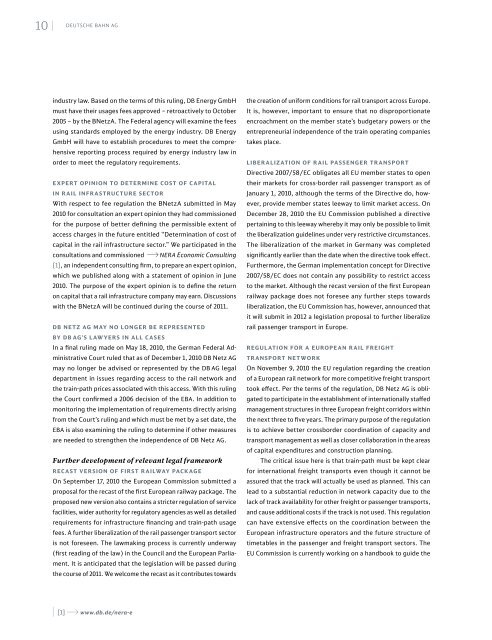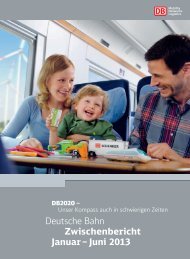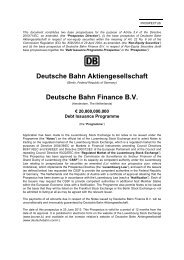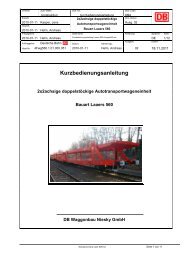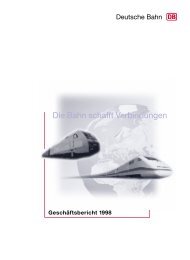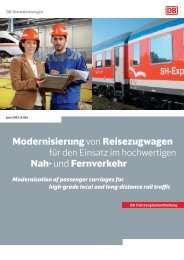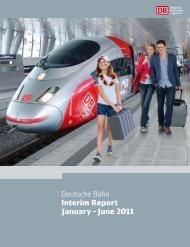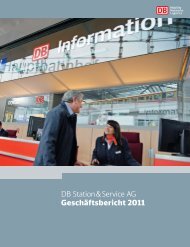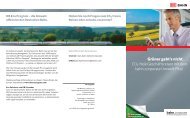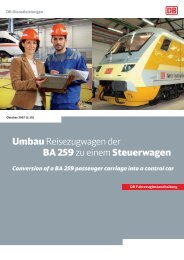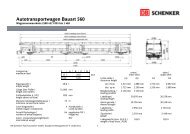PDF Download - Deutsche Bahn AG
PDF Download - Deutsche Bahn AG
PDF Download - Deutsche Bahn AG
You also want an ePaper? Increase the reach of your titles
YUMPU automatically turns print PDFs into web optimized ePapers that Google loves.
10 |<br />
DEUTSCHE BAHN <strong>AG</strong><br />
industry law. Based on the terms of this ruling, DB Energy GmbH<br />
must have their usages fees approved – retroactively to October<br />
2005 – by the BNetzA. The Federal agency will examine the fees<br />
using standards employed by the energy industry. DB Energy<br />
GmbH will have to establish procedures to meet the compre-<br />
hensive reporting process required by energy industry law in<br />
order to meet the regulatory requirements.<br />
EXPERT OPINION TO DETERMINE COST OF CAPITAL<br />
IN RAIL INFRASTRUCTURE SECTOR<br />
With respect to fee regulation the BNetzA submitted in may<br />
2010 for consultation an expert opinion they had commissioned<br />
for the purpose of better defining the permissible extent of<br />
access charges in the future entitled “Determination of cost of<br />
capital in the rail infrastructure sector.” We participated in the<br />
consultations and commissioned A NERA Economic Consulting<br />
[1], an independent consulting firm, to prepare an expert opinion,<br />
which we published along with a statement of opinion in June<br />
2010. The purpose of the expert opinion is to define the return<br />
on capital that a rail infrastructure company may earn. Discussions<br />
with the BNetzA will be continued during the course of 2011.<br />
DB NETZ <strong>AG</strong> MAY NO LONGER BE REPRESENTED<br />
BY DB <strong>AG</strong>’S LAWYERS IN ALL CASES<br />
In a final ruling made on may 18, 2010, the German Federal Ad -<br />
ministrative Court ruled that as of December 1, 2010 DB Netz <strong>AG</strong><br />
may no longer be advised or represented by the DB <strong>AG</strong> legal<br />
department in issues regarding access to the rail network and<br />
the train-path prices associated with this access. With this ruling<br />
the Court confirmed a 2006 decision of the EBA. In addition to<br />
monitoring the implementation of requirements directly arising<br />
from the Court’s ruling and which must be met by a set date, the<br />
EBA is also examining the ruling to determine if other measures<br />
are needed to strengthen the independence of DB Netz <strong>AG</strong>.<br />
Further development of relevant legal framework<br />
RECAST vERSION OF FIRST RAILWAY PACk<strong>AG</strong>E<br />
On September 17, 2010 the European Commission submitted a<br />
proposal for the recast of the first European railway package. The<br />
proposed new version also contains a stricter regulation of service<br />
facilities, wider authority for regulatory agencies as well as detailed<br />
requirements for infrastructure financing and train-path usage<br />
fees. A further liberalization of the rail passenger transport sector<br />
is not foreseen. The lawmaking process is currently underway<br />
(first reading of the law) in the Council and the European Parliament.<br />
It is anticipated that the legislation will be passed during<br />
the course of 2011. We welcome the recast as it contributes towards<br />
| [1] A www.db.de/nera-e<br />
the creation of uniform conditions for rail transport across Europe.<br />
It is, however, important to ensure that no disproportionate<br />
encroachment on the member state’s budgetary powers or the<br />
entrepreneurial independence of the train operating companies<br />
takes place.<br />
LIBERALIZATION OF RAIL PASSENGER TRANSPORT<br />
Directive 2007/58/EC obligates all EU member states to open<br />
their markets for cross-border rail passenger transport as of<br />
January 1, 2010, although the terms of the Directive do, however,<br />
provide member states leeway to limit market access. On<br />
December 28, 2010 the EU Commission published a directive<br />
pertaining to this leeway whereby it may only be possible to limit<br />
the liberalization guidelines under very restrictive circumstances.<br />
The liberalization of the market in Germany was completed<br />
significantly earlier than the date when the directive took effect.<br />
Furthermore, the German implementation concept for Directive<br />
2007/58/EC does not contain any possibility to restrict access<br />
to the market. Although the recast version of the first European<br />
railway package does not foresee any further steps towards<br />
liberalization, the EU Commission has, however, announced that<br />
it will submit in 2012 a legislation proposal to further liberalize<br />
rail passenger transport in Europe.<br />
REGULATION FOR A EUROPEAN RAIL FREIGHT<br />
TRANSPORT NETWORk<br />
On November 9, 2010 the EU regulation regarding the creation<br />
of a European rail network for more competitive freight transport<br />
took effect. Per the terms of the regulation, DB Netz <strong>AG</strong> is obligated<br />
to participate in the establishment of internationally staffed<br />
management structures in three European freight corridors within<br />
the next three to five years. The primary purpose of the regulation<br />
is to achieve better crossborder coordination of capacity and<br />
transport management as well as closer collaboration in the areas<br />
of capital expenditures and construction planning.<br />
The critical issue here is that train-path must be kept clear<br />
for international freight transports even though it cannot be<br />
assured that the track will actually be used as planned. This can<br />
lead to a substantial reduction in network capacity due to the<br />
lack of track availability for other freight or passenger transports,<br />
and cause additional costs if the track is not used. This regulation<br />
can have extensive effects on the coordination between the<br />
European infrastructure operators and the future structure of<br />
timetables in the passenger and freight transport sectors. The<br />
EU Commission is currently working on a handbook to guide the


